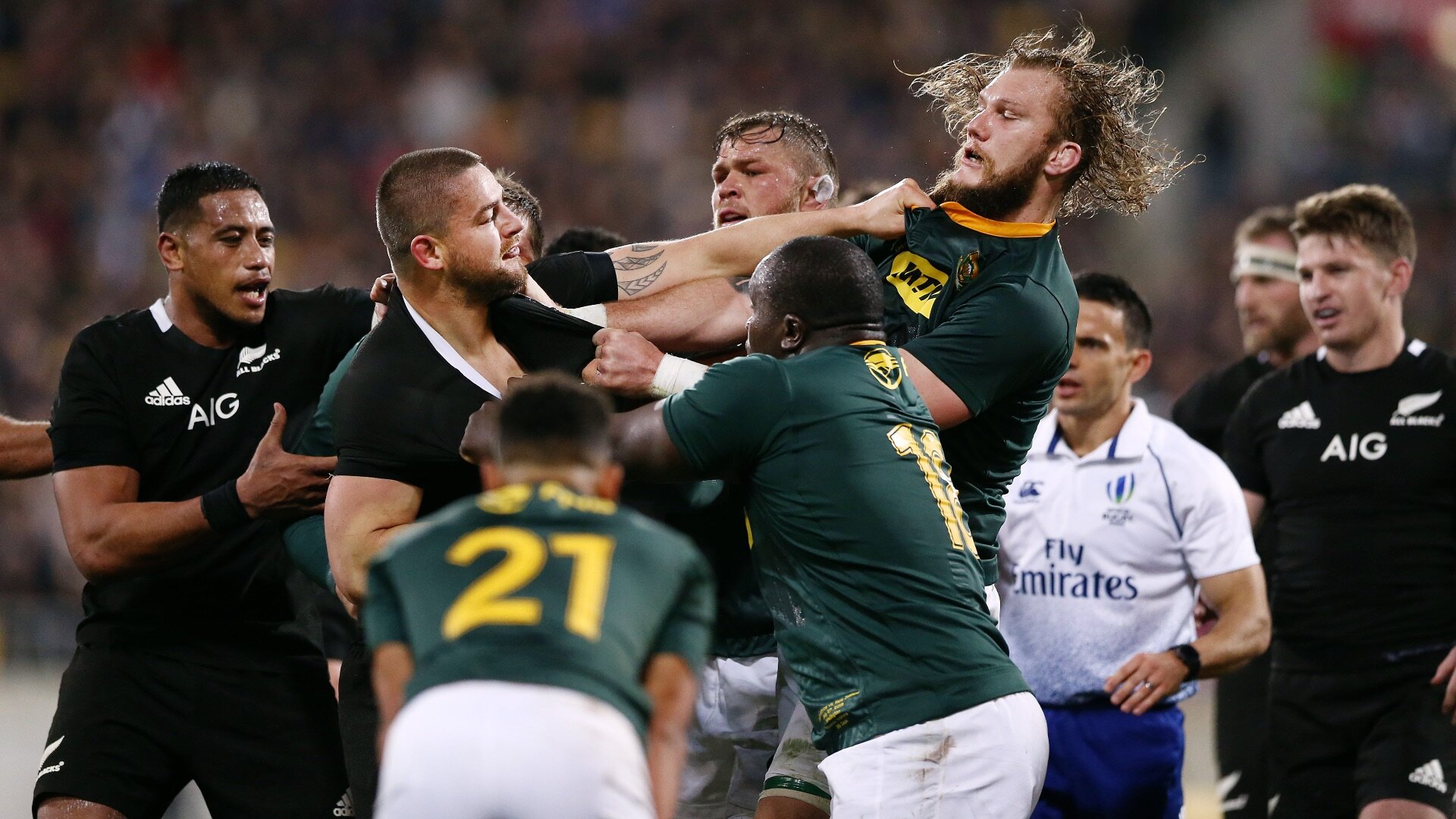Springboks' RWC trajectory continues to rise ahead of Japan

Relief seemed to be the overriding emotion for the Springboks as they walked off the Cake Tin pitch in Wellington on Saturday having tied 16-all with the All Blacks.
A lack of chemistry and ruthless, clinical finishing held the Springboks back in the first half of the game where a late Jack Goodhue try gave the All Blacks a 7-6 lead at the interval despite South Africa having been in complete control for the majority of those 40 minutes.
As the All Blacks grew into the game, it looked as though that profligacy in the first half was going to cost the visitors. A late flourish, however, delivered the Springboks a morale-boosting draw as Herschel Jantjies grabbed a try at the death through his own work rate and ambition, continuing his scintillating start to international rugby.
Had more of the starting XV from Wellington played a week before in Johannesburg, maybe that chemistry would have been there and a win could have been on the cards, but this is a year where, with all due respect to The Rugby Championship, there is little riding on this tournament as all eyes are instead on the Rugby World Cup in Japan.
There will be a fair amount of short-term debate over whether or not Rassie Erasmus was right to rest so many of his frontline players against Australia last weekend, following what could have been against New Zealand – again – in Wellington, but the upcoming World Cup should validate that decision.
With that in mind, there were plenty of positives to take away from Saturday’s contest, just as there were against the Wallabies a week before. One particular standout was outside centre Lukhanyo Am, with the Sharks man thriving on the defensive side of the ball.
His work restricting New Zealand’s width was exceptional as he successfully shut down three of the four times that the All Blacks looked to move the ball wide on the openside in the first half. Whether it was Am tackling man and ball or obstructing the passing lanes, New Zealand found it extremely difficult to get outside the centre.
The one time that the All Blacks were able to get around him was late in the half and coming off of transition ball. Even then, Am was shutting down the passing lane, although Makazole Mapimpi had also bitten in and there was space on the outside for a looped pass and Beauden Barrett to exploit.
In the second half, when Am was positioned in the 13 channel on the openside, he was able to shut down all three of New Zealand’s attacks that attempted to go wide, before he was replaced in the 52nd minute.
His linespeed and decision-making was one of – if not they key – component in stifling the All Blacks’ usually clinical back line play, with the hosts able to more freely move the ball with width and tempo after he was replaced.
His tackling closer to the ruck on the more physical carriers was impressive, too, not least so for his dump tackle and turnover on Sonny Bill Williams early in the game.
https://www.instagram.com/p/B0ald-kIGUb/
The half-back combination of Faf de Klerk and Handré Pollard showed good chemistry in the first half and dovetailed nicely, even if the end product was missing from the Springboks overall. Pollard had some joy counter-attacking from New Zealand’s unusually loose kicking game and de Klerk was typically opportunistic, hunting and creating space.
The returns of Franco Mostert and Duane Vermeulen also brought a welcome injection of carrying options to the South African pack, something which had been lacking a week before against Australia. Steven Kitshoff was a pest at the contact area, frequently slowing down New Zealand’s ball as well providing a solid presence at the scrum.
Cheslin Kolbe also flashed his potential with some incisive running and one aerial ball where he bested the much larger Rieko Ioane, who also had the positioning for the catch. Malcolm Marx, like Bongi Mbonambi the week before, had some early issues at the lineout before cleaning them up as the game went on.
Siya Kolisi’s return from injury should ease any worries Erasmus might have as will the ability on the floor of Francois Louw, who prospered in his cameo off the bench.
https://twitter.com/RugbyPass/status/1155060349495926784?ref_src=twsrc%5Egoogle%7Ctwcamp%5Eserp%7Ctwgr%5Etweet
The South African back three weren’t blessed with too many opportunities in Wellington which was as much down to game plan as it was individual performance, although it does keep the door open for the likes of Warrick Gelant and Sbu Nkosi.
Having had very definitive and pre-planned selection decisions in mind for the games against Australia and New Zealand, Erasmus now has the chance to fine-tune in the upcoming Test with Argentina in Salta.
Erasmus and the Boks have an extra week of preparation before that game and there will be no concerns over travel limiting training time ahead of the game.
Boks show ???, Pollard nerves as Jantjies ????? in Wellington as well.
Match report here: https://t.co/DZ14040wlQ pic.twitter.com/RNKO7BD23o— Springboks (@Springboks) July 27, 2019
There are spots up for grabs in this Springbok side and while the game in Wellington showed that the current first-choice starting XV can hold their own with the best (and the win over Australia showed that the depth of player is also there for the team to have success), there is still time for players jockeying between the two groups.
The game in Salta could be our best indication yet of how the Springboks will look at the RWC, not to mention providing an opportunity for the impressive players in Johannesburg a week ago to force their way into Erasmus’ plans.
WATCH: The insightful RugbyPass documentary with Nemani Nadolo, the Fijian playing at Montpellier

























